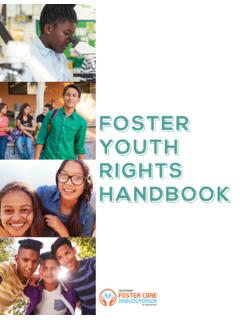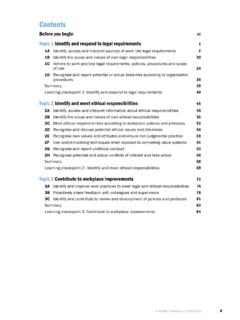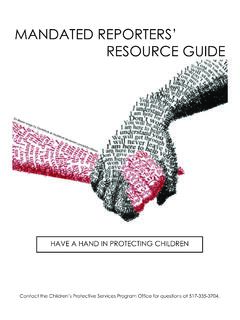Transcription of Foster Youth Bill of Rights
1 The Foster Youth Bill of Rights WIC (a) All children placed in Foster care, either voluntarily or after being adjudged a ward or dependent of the juvenile court pursuant to Section 300, 601, or 602, shall have the Rights specified in this section. These Rights also apply to nonminor dependents in Foster care, except when they conflict with nonminor dependents retention of all their legal decisionmaking authority as an adult. The Rights are as follows: (1) To live in a safe, healthy, and comfortable home where they are treated with respect. If the child is an Indian child , to live in a home that upholds the prevailing social and cultural standards of the child s Indian community, including, but not limited to, family, social, and political ties. (2) To be free from physical, sexual, emotional, or other abuse, corporal punishment, and exploitation.
2 (3) To receive adequate and healthy food, adequate clothing, grooming and hygiene products, and an age-appropriate allowance. Clothing and grooming and hygiene products shall respect the child s culture, ethnicity, and gender identity and expression. (4) To be placed in the least restrictive setting possible, regardless of age, physical health, mental health, sexual orientation, and gender identity and expression, juvenile court record, or status as a pregnant or parenting Youth , unless a court orders otherwise. (5) To be placed with a relative or nonrelative extended family member if an appropriate and willing individual is available. (6) To not be locked in any portion of their Foster care placement, unless placed in a community treatment facility. (7) To have a placement that utilizes trauma-informed and evidence-based deescalation and intervention techniques, to have law enforcement intervention requested only when there is an imminent threat to the life or safety of a child or another person or as a last resort after other diversion and deescalation techniques have been utilized, and to not have law enforcement intervention used as a threat or in retaliation against the child .
3 (8) To not be detained in a juvenile detention facility based on their status as a dependent of the juvenile court or the child welfare services department s inability to provide a Foster care placement. If they are detained, to have all the Rights afforded under the United States Constitution, the California Constitution, and all applicable state and federal laws. (9) To have storage space for private use. (10) To be free from unreasonable searches of personal belongings. (11) To be provided the names and contact information for social workers, probation officers, attorneys, service providers, Foster Youth advocates and supporters, Court Appointed Special Advocates (CASAs), and education Rights holder if other than the parent or parents, and when applicable, representatives designated by the child s Indian tribe to participate in the juvenile court proceeding, and to communicate with these individuals privately.
4 (12) To visit and contact siblings, family members, and relatives privately, unless prohibited by court order, and to ask the court for visitation with the child s siblings. (13) To make, send, and receive confidential telephone calls and other electronic communications, and to send and receive unopened mail, unless prohibited by court order. (14) To have social contacts with people outside of the Foster care system, including, but not limited to, teachers, coaches, religious or spiritual community members, mentors, and friends. If the child is an Indian child , to have the right to have contact with tribal members and members of their Indian community consistent with the prevailing social and cultural conditions and way of life of the Indian child s tribe. (15) To attend religious services, activities, and ceremonies of the child s choice, including, but not limited to, engaging in traditional Native American religious practices.
5 (16) To participate in extracurricular, cultural, racial, ethnic, personal enrichment, and social activities, including, but not limited to, access to computer technology and the internet, consistent with the child s age, maturity, developmental level, sexual orientation, and gender identity and expression. (17) To have fair and equal access to all available services, placement, care, treatment, and benefits, and to not be subjected to discrimination or harassment on the basis of actual or perceived race, ethnic group identification, ancestry, national origin, color, religion, sex, sexual orientation, gender identity and expression, mental or physical disability, or HIV status. (18) To have caregivers, child welfare and probation personnel, and legal counsel who have received instruction on cultural competency and sensitivity relating to sexual orientation, gender identity and expression, and best practices for providing adequate care to lesbian, gay, bisexual, and transgender children in out-of-home care.
6 (19) To be placed in out-of-home care according to their gender identity, regardless of the gender or sex listed in their court, child welfare, medical, or vital records, to be referred to by the child s preferred name and gender pronoun, and to maintain privacy regarding sexual orientation and gender identity and expression, unless the child permits the information to be disclosed, or disclosure is required to protect their health and safety, or disclosure is compelled by law or a court order. (20) To have child welfare and probation personnel and legal counsel who have received instruction on the federal Indian child Welfare Act of 1978 (25 Sec. 1901 et seq.) and on cultural competency and sensitivity relating to, and best practices for, providing adequate care to Indian children in out-of-home care.
7 (21) To have recognition of the child s political affiliation with an Indian tribe or Alaskan village, including a determination of the child s membership or citizenship in an Indian tribe or Alaskan village; to receive assistance in becoming a member of an Indian tribe or Alaskan village in which the child is eligible for membership or citizenship; to receive all benefits and privileges that flow from membership or citizenship in an Indian tribe or Alaskan village; and to be free from discrimination based on the child s political affiliation with an Indian tribe or Alaskan village. (22) (A) To access and receive medical, dental, vision, mental health, and substance use disorder services, and reproductive and sexual health care, with reasonable promptness that meets the needs of the child , to have diagnoses and services explained in an understandable manner, and to participate in decisions regarding health care treatment and services.
8 This right includes covered gender affirming health care and gender affirming mental health care, and is subject to existing laws governing consent to health care for minors and nonminors and does not limit, add, or otherwise affect applicable laws governing consent to health care. (B) To view and receive a copy of their medical records to the extent they have the right to consent to the treatment provided in the medical record and at no cost to the child until they are 26 years of age. (23) Except in an emergency, to be free of the administration of medication or chemical substances, and to be free of all psychotropic medications unless prescribed by a physician, and in the case of children, authorized by a judge, without consequences or retaliation. The child has the right to consult with and be represented by counsel in opposing a request for the administration of psychotropic medication and to provide input to the court about the request to authorize medication.
9 The child also has the right to report to the court the positive and adverse effects of the medication and to request that the court reconsider, revoke, or modify the authorization at any time. (24) (A) To have access to age-appropriate, medically accurate information about reproductive health care, the prevention of unplanned pregnancy, and the prevention and treatment of sexually transmitted infections. (B) At any age, to consent to or decline services regarding contraception, pregnancy care, and perinatal care, including, but not limited to, abortion services and health care services for sexual assault without the knowledge or consent of any adult. (C) At 12 years of age or older, to consent to or decline health care services to prevent, test for, or treat sexually transmitted diseases, including HIV, and mental health services, without the consent or knowledge of any adult.
10 (25) At 12 years of age or older, to choose, whenever feasible and in accordance with applicable law, their own health care provider for medical, dental, vision, mental health, substance use disorder services, and sexual and reproductive health care, if payment for the service is authorized under applicable federal Medicaid law or other approved insurance, and to communicate with that health care provider regarding any treatment concerns or needs and to request a second opinion before being required to undergo invasive medical, dental, or psychiatric treatment. (26) To confidentiality of medical and mental health records, including, but not limited to, HIV status, substance use disorder history and treatment, and sexual and reproductive health care, consistent with existing law. (27) To attend school, to remain in the child s school of origin, to immediate enrollment upon a change of school, to partial credits for any coursework completed, and to priority enrollment in preschool, afterschool programs, a California State University, and each community college district, and to receive all other necessary educational supports and benefits, as described in the Education Code.







